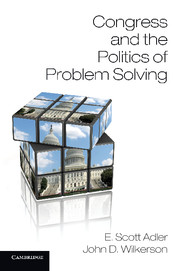Book contents
- Frontmatter
- Contents
- Tables and Figures
- Preface
- Part I
- Part II
- 4 Problem-Solving Constraints and Legislative Institutions
- 5 Agenda Scarcity, Problem Solving, and Temporary Legislation
- Part III
- Part IV
- Appendix A
- Appendix B Assignment of Bills across Issue Types
- Appendix C Calculating Committee Roll Rates
- Bibliography
- Index
5 - Agenda Scarcity, Problem Solving, and Temporary Legislation
Published online by Cambridge University Press: 05 January 2013
- Frontmatter
- Contents
- Tables and Figures
- Preface
- Part I
- Part II
- 4 Problem-Solving Constraints and Legislative Institutions
- 5 Agenda Scarcity, Problem Solving, and Temporary Legislation
- Part III
- Part IV
- Appendix A
- Appendix B Assignment of Bills across Issue Types
- Appendix C Calculating Committee Roll Rates
- Bibliography
- Index
Summary
Nothing … could justify [a perpetual law] but the necessity, simplicity, and the immutability of the object, and the immutability of the circumstances which related to it [–] circumstances which would render a law equally necessary now, and on all future occasions.
Rep. Thomas Tudor Tucker, 1789 (cited in Bickford, Bowling, and Veit 1992)Enacting a law to address a problem in society is just the first step in an ongoing governing process. Problems are often difficult to understand; changing societal conditions warrant occasional reviews and adjustments. The preceding quote comes from the debate over the Impost Act, the very first substantive law enacted by the Congress (in 1789), which imposed duties on imports. Instead of making it “perpetual,” Congress specified a temporary law that would expire in 1796. Temporary laws have been enacted throughout Congress’s history and have become increasingly common in recent decades. Why do lawmakers often choose to enact laws on a temporary basis when nothing prohibits them from amending a permanent law at a future point in time?
This is the question explored in this chapter. We begin by examining the scope and history of temporary legislation and then review a range of explanations offered for their use. We then argue that a central explanation for why short-term expirations have been used with increasing frequency since the 1960s is to promote more regular reviews of policy effectiveness as a means of addressing problems before they become crises. A short-term authorization steers limited congressional (and executive) attention and resources toward particular policies. For a permanent law, the reversion point if no action is taken is the policy status quo. For a temporary law, it is no policy at all. Expiring programs receive priority consideration, which in turn influences how lawmakers invest their own limited time and resources. Walker argues that such recurring issues represent a substantial proportion of the Senate’s agenda. We conclude by examining lawmaking activity in the House of Representatives at three different stages – bill introductions, passed bills, and roll call votes – and find that such recurring issues make up a substantial proportion of the House agenda.
- Type
- Chapter
- Information
- Congress and the Politics of Problem Solving , pp. 66 - 88Publisher: Cambridge University PressPrint publication year: 2013



